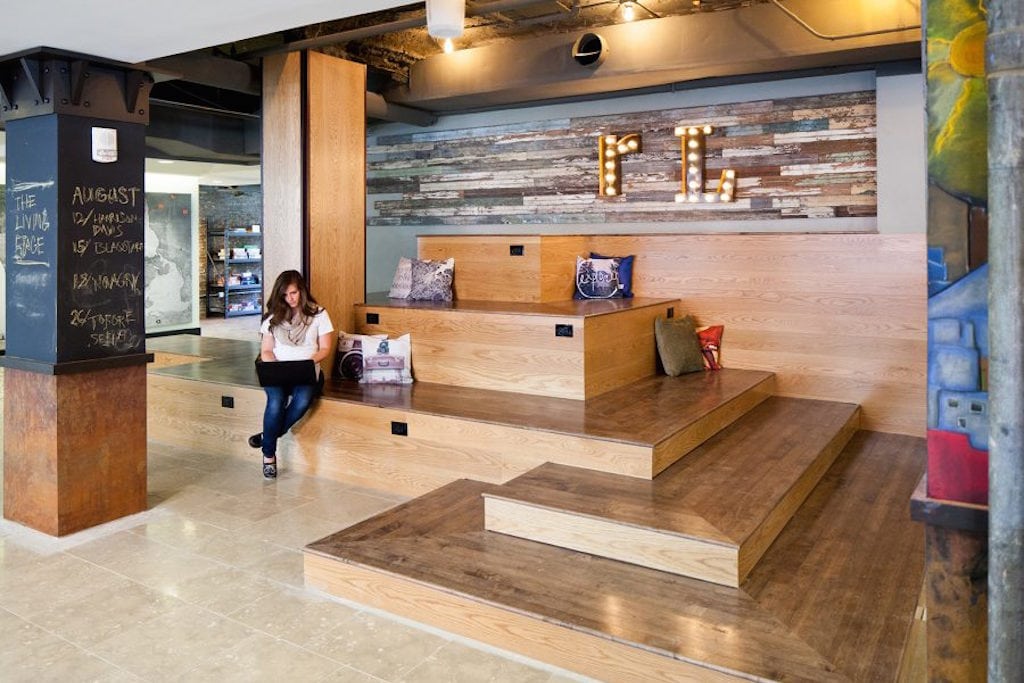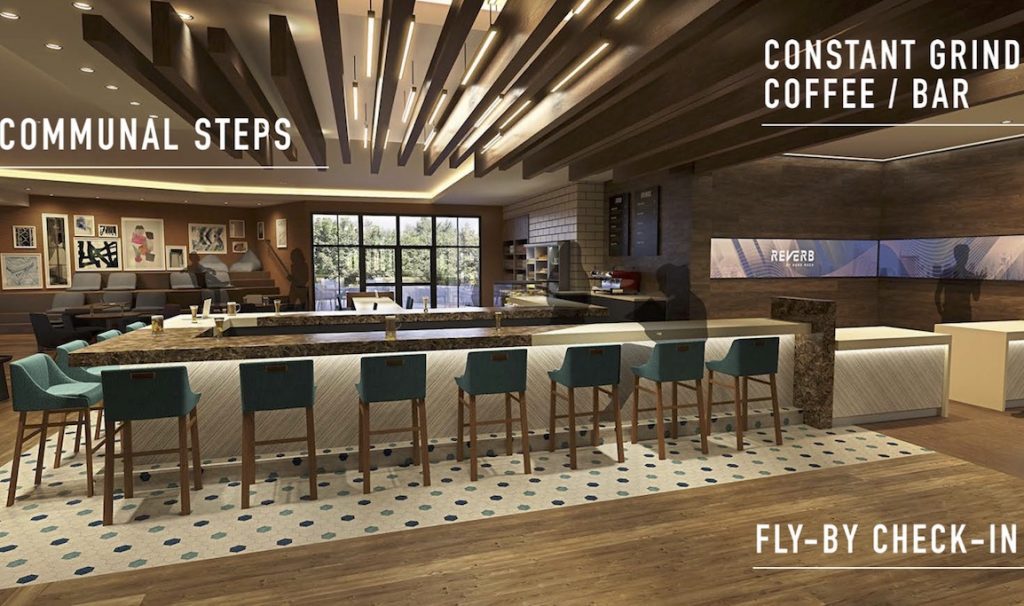Red Lion Sues Hard Rock Hotels for Infringement in Race to Win Over Millennials

Skift Take
When it comes to appealing to Millennials — of which there are now 75.4 million in the United States alone — hotel companies are doing all they can to launch wallet-friendly, yet still-stylish accommodations that emphasize such features as co-working spaces, communal stadium seating, artisanal goods, and craft beers.
Often classified as midscale hotels, these brands include the new Tru by Hilton and Marriott’s Moxy, for example. And there are more of these brands in the works: Trump Hotels’ American Idea, for one, and InterContinental Hotels Group’s yet-to-be-named one.
And now, one U.S. hotel company is suing another in an effort to either protect its intellectual property rights or keep the competition at bay, depending on your perspective.
On July 12, Red Lion Hotels Corporation (RLHC) filed a lawsuit against Hard Rock International for “trade dress infringement, injury to business reputation, and unfair competition.”
RLHC alleges that Hard Rock’s newest hotel brand, Reverb, is a carbon copy of its own Hotel RL brand, which it launched in October 2014 and currently has seven properties throughout the United States.
Hard Rock announced its Reverb by Hard Rock brand at the NYU Hospitality Investment Industry Conference in June, and it currently has no properties. Hard Rock trademarked the name in 2015, however.
In court documents, RLHC said that not only does Hard Rock’s Reverb brand go after the same audience (“millennial mindset travelers”) and copy its “Internal industry model” of opening up these hotels in urban markets, but that the “copying” of “signature elements” is “remarkable — and unmistakable.”
Specifically, RLHC alleges the following examples:
- Hotel RL’s lobby/coffee bar is Reverb’s “Constant Grind Coffee/Bar”
- The Living Stage at Hotel RL is “The Stage” at Reverb and will also be used for live entertainment as it is at Hotel RL
- The Steps at Hotel RL (stadium-style seating) are “Communal Steps” at Reverb
- Both hotel brands have the same tech-driven check-in process
These elements alone, aren’t necessarily unique to either the Hotel RL or Reverb brand. In 2014, for example, Starwood’s Le Meridien brand launched a coffeehouse-inspired campaign transforming its lobbies into European-style coffeehouses. Other hotel brands have similarly carved out spaces in their hotels as entertainment venues, and stadium-style public seating can be seen at a variety of hotel brands, from Ian Schrager’s new Public New York and Marriott’s M Beta Hotel in Charlotte, North Carolina, to IHG’s own EVEN hotels brand.
And let’s face it: All major hotel companies are working to offer mobile check-in and to simplify the check-in process for guests with the use of technology, or self-check-in kiosks.
RLHC, however, alleges that these similarities aren’t just the result of a shared effort to appeal to Millennials; it’s the fact that Red Lion and Hard Rock hired the same hotel consulting group to develop their respective brands.
“That group [Chicago-based Gettys Group] also provided similar consulting services to Hard Rock, and so it raised our concerns even higher that they were really working off of our information to develop their plans and designs for this new brand,” Douglas Ludwig, RLHC CFO, told Skift. “Clearly, we have the full documentation of what Gettys provided to us for the Hotel RL brand. There is so much overlap between what they provided to us and what this new Hard Rock brand represents.
"If there’s one or two things and other people are doing it, that’s not the issue. It’s the quantity of overlap. We are protecting our rights. We are protecting, effectively, all the previous work we’ve done to establish Hotel RL. It’s really the culmination and volume of copying that appears to be, so obviously, an infringement on our rights.”
Ludwig said RLHC plans to take legal action against Gettys Group, as well.
Skift reached out to the Gettys Group but a spokesperson declined to comment.
Hard Rock issued the following statement: “Hard Rock International believes that the RLH Corporation’s claims are without merit, and will vigorously defend itself against such claims. Hard Rock has more than 46 years of experience and we are the authority in providing premium, lifestyle offerings and authentic music experiences to guests around the world. As this is pending litigation, Hard Rock has no further comment.”
Makarand Mody, assistant professor of hospitality marketing at the Boston University School of Hospitality Administration said of the shared "signature elements:" "While the coffee bar may not be as much of a problem, one of the issues that the Reverb may have brought upon itself is that the names of the other two concepts are similar to the Hotel RL: Hotel RL's Living Stage and Reverb's Stage, and Hotel RL's Steps and Reverb's Communal Steps," Mody said.
He added, "Many of the themes that new hotel brands are trying to incorporate, across hotel categories, are indeed similar: local experiences, artisanal food and beverage, and an emphasis on communal spaces, among others. While it's much harder to prove that the ideas underlying these design concepts have been copied, the fact that they are also being called something very similar may create a problem for Reverb."
Ludwig said that during the brand development process for Hotel RL, RLHC provided “initial guidance as to which audience we wanted to focus on, and some of the initial elements,” and that the final result would be the effort of “a lot of input from both Gettys and ourselves, but obviously with us having the final sign-off on what it should be.”
He said the company’s contract with Gettys Group included non-disclosure and confidentiality requirements and “it appears from the facts of this situation, they clearly disregarded that.”
He said Red Lion will also take legal action against Gettys Group and added, “We would not choose to use Gettys going forward given this blatant plagiarizing that’s occurred here. That’s definitive.”
As for its lawsuit against Hard Rock, RLHC wants Hard Rock to “cease and desist in terms of their rolling out of this new brand on the basis that they have currently described,” Ludwig said. “We’ll take what actions we deem necessary to bring closure to this problem and to be properly compensated for clear damages that have been caused by this situation.”
This isn't the first time a hotel company has accused a competitor of intellectual property theft. Starwood Hotels & Resorts sued Hilton in 2009, alleging that two of its former executives who joined Hilton had conspired to steal secrets from W Hotels to help Hilton create its own version of W, to be called Denizen.
Hilton later paid Starwood $75 million to settle civil charges of corporate espionage, and agreed not to launch or acquire a lifestyle brand like Denizen for two years.
"This is definitely interesting given that Reverb is still in the development stage and doesn't have an actual hotel," said Mody. "I think RLHC is trying to nip this in the bud, like in the W/Denizen case, preventing the brand from even coming into existence. Clearly, there is a legal precedent created by the W/Denizen case, so I would think RLHC hopes to achieve a similar result: fines and, importantly, an injunction against the development."
Still, Mody noted that in Starwood's case against Hilton, there was clear evidence that Hilton admitted to having possession of Starwood's documents and it "was more of an open-and-shut case. That doesn't seem to be the case here for RLHC. However, there is the fact that the same branding group was used by both firms, which may help RLHC in arguing its case."
Here is the RLHC lawsuit:
[gview file="https://skift.com/wp-content/uploads/2017/07/Red-Lion-complaint.pdf"]





